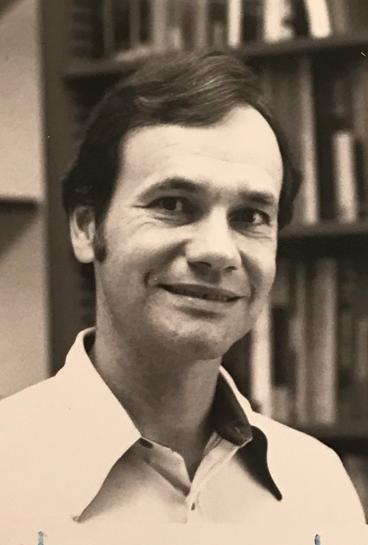Since 2018, we have conducted dozens of interviews with former Bureau of Business and Economic Research (BBER) directors, staff, and student researchers to learn our history. Additionally, we have found archived historic documents, news articles, and photographs. We cataloged it all and are excited to share it with you.
The stories highlighting the Duluth Business Index, Interim Chancellor (and former BBER student) McMillan, and former Director Jerry Peterson were the first peeks into our history. This article—highlighting former BBER Director Rick Lichty—continues showcasing the BBER’s rich history. We’ll continue to share the historic stories with you in the future.
In the mid-1990s, Duluth’s economy was beginning to recover from the economic downturn of the late 1970s and early 1980s. According to the St. Louis County Planning Commission, “1995 was the highest year for domestic and international shipping from the Duluth port with over 40 million tons” in the history of the port up until that time.
At that same time, the BBER was experiencing changes of its own. Long-time director Jerry Peterson was looking to step down from his role, and the BBER needed new leadership. LSBE Dean David Vose asked Dr. Richard (Rick) Lichty—a senior economics faculty member—to serve in the role. Lichty stepped in alongside assistant director James (Jim) Skurla, who became BBER assistant director in 1983. Shortly thereafter, BBER Writer/Editor Jean Jacobsen was hired to support the research team. She was in her role from 1995-2001 (for more on Jacobsen's contributions, see page 6 in LSBE's Fall 2022 True North newsletter).
Prior to taking on his role as BBER director, Lichty had served as an economics faculty member for more than 20 years, since 1971. In a 2018 conversation with us, he recalled traveling to Duluth from Kansas in July for his initial interview for the economics department. He and his wife saw the ships coming into the Duluth harbor and were immediately taken with the city. His wife, surprised to see spring flowers blooming in July asked, “Do lilacs bloom twice here?” (She did not realize the late springs that northern Minnesota has.)
Lichty’s background in regional urban economics was a natural fit for the role of BBER director. Prior to coming to UMD, he had studied extensively with M. Jarvis Emerson, a professor in the Department of Economics at Kansas State University. Emerson was an early proponent of input-output (I-O) analysis and constructed numerous survey-based I-O tables for the state of Kansas. In working with Dr. Emerson, Lichty remembered using a computer in a hermetically sealed room to construct the models and recalled that the team had to run the models overnight to allow for the lengthy computing time.
With his strong background in input-output modeling, Lichty brought a set of skills that expanded the services that the Bureau was able to provide. The department transitioned to conducting I-O analysis as a service and was able to begin conducting more funded research.
During Lichty’s time as director, the BBER conducted several notable studies, including an evaluation of business attraction prospects for the state of Minnesota (1996), a skills assessment of northeast Minnesota’s labor force (1998), an industry cluster study, and a physical inventory and a valuation of state-owned lands within the Boundary Waters Canoe Area (2003), among many others.
Lichty was also regularly sought out by the media for his take on local and national economic events. Of his role in the local media Lichty noted, “The BBER not only gave people the numbers they were seeking but sought to teach the public about the meaning behind the numbers themselves.”
But for Lichty, the greatest reward of serving as BBER director was working with the students. He noted, “I enjoyed my time at the Bureau mostly because of the students, Jim [Skurla], Jean [Jacobsen] and all of the great people I worked with." Under Lichty’s leadership, the role of student researchers became much more important to the Bureau’s mission. Lichty saw the work the students were doing as important in preparing them for the real world. According to Lichty, “In all the Bureau’s research projects, the undergrads were treated like grad students. Their names were put on every project we did.”
Chris McIntosh is a UMD alumni who currently serves as a faculty member in the economics department at UMD. During his time as an undergrad at UMD, he also worked as a research assistant at the BBER under Lichty’s leadership. McIntosh recalled, “What I remember most was the people. Rick Lichty and Jean Jacobson were amazing to work for, very patient and willing to challenge me. The BBER was a fun place to work; Rick and Jean worked very hard and took the projects seriously but there was also regular laughter, discussion of life, and occasional singing. They helped teach me what it means to be a well-rounded individual.”
In 2002, after serving as BBER director for eight years, Lichty returned to his role as a full-time faculty member and his true passion of teaching. Throughout his time at UMD, Lichty was honored with several notable accomplishments, receiving the esteemed Horace T. Morse teaching award and two other national teaching awards. In 2000, Lichty also coauthored a textbook titled Urban Regional Economics with Wilbur Maki—a widely respected regional economist from the University of Minnesota Applied Economics department.
With his passion for teaching, engaging leadership style, and expertise in input-output modeling, Lichty expanded the services the BBER was able to provide and provided students with even more opportunities to engage in applied research for the community. Lichty’s contributions are still felt to this day.

